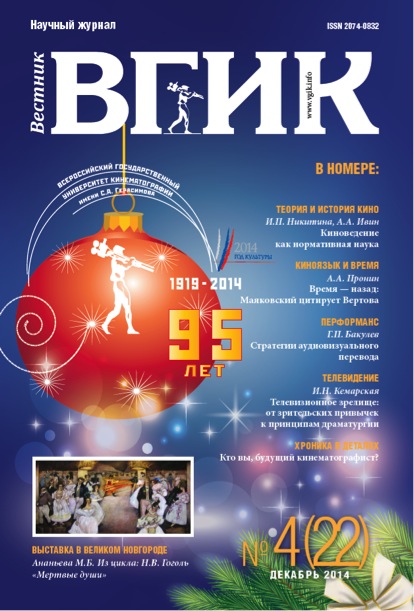Time - Backwards: Mayakovsky Quotes Vertov
- 作者: Pronin A.A.1
-
隶属关系:
- Saint Petersburg State University
- 期: 卷 6, 编号 4 (2014)
- 页面: 26-32
- 栏目: FILM LANGUAGE AND TIME | IMAGE GENESIS
- URL: https://journals.eco-vector.com/2074-0832/article/view/14803
- DOI: https://doi.org/10.17816/VGIK6426-32
- ID: 14803
如何引用文章
全文:
详细
The article is devoted to the problem of creative interaction of such significant figures of Russian revolutionary avant-garde of the 1920's, as Vladimir Mayakovsky and Dziga Vertov. The relevance of the study is determined by everlasting public interest in one of the most significant pages in the history of Russian cinema, and its novelty stems from the fact that the author has discovered and analyzed previously unnoticed evidence of citing of Vertov's “Kino-eye” (1924) in the screenplays by Mayakovsky “How are you?” (1927). In his article the mechanism of Vertov’s cinema texts incorporation into their own literary text script is thoroughly investigated, and a convincing proof for the reason why Mayakovsky resorted to this technique is provided. In addition, the article convincingly shows how the lyrical theme of the script changes the meaning of the quotation, which allows to arrive at the conclusion that “quotatione, demonstrated in the original that is the power of cinema over time (“negative of time”), in the script by Mayakovsky becomes a metaphor for the lack of it as such”. In the third script, the author shows bread’s way back from the shop counter to the peasant’s fields (frames 16-39), which fully corresponds to the action of the fourth part of the D. Vertov's documentary “Kino-eye” (32-40 minutes). The article advances the hypothesis that Mayakovsky was counting on “recognition of the twist”, and a possible D. Vertov’s response on this creative game, proposed by Mayakovsky, might be “Man with a Movie Camera” (1929), since according to the plan and the composition it resonates with the script by Mayakovsky being a likewise lyrical diary of the artist as “How are you?”. The author concludes that “Man with a Movie Camera” is probably a sort of intravitam “screen adaptation” of Mayakovsky’s script.
作者简介
Alexander Pronin
Saint Petersburg State University
编辑信件的主要联系方式.
Email: editor@vestnik-vgik.com
PhD in Philology, Assistant Professor (Television and Radio Journalism Department)
参考
- Вертов Д. Статьи. Дневники. Замыслы. - М.: Искусство, 1966. - 320 с.
- Гуревич М.Е. Анимация вещи и овеществление маски. О некоторых чертах кинопоэтики Маяковского // Киноведческие записки. - 1997. - № 33.
- Кулешов Л., Хохлова А. 50 лет в кино. - М.: Искусство, 1975. - 304 с.
- Маяковский В. Полное собрание сочинений в 13 томах. - М.: Гослитиздат, 19551961. - Т. XI-XII. - 709 с.
- Пронин А. Киносценарий Владимира Маяковского «Как поживаете?»: блестящее поражение // Вопросы литературы. - 2013. - № 4. - С. 404-424.
- Россомахин А. «Труба марсиан»: Комментарии и контексты //Хлебников В. Труба марсиан. - СПб.: Издательство Европейского университета в Санкт-Петербурге, 2013.
- Шкловский В. Жили-были. - М.: Советский писатель, 1966. - 551 с.
- Цивьян Ю.Г. Историческая рецепция кино. Кинематограф в России. 1896-1930. - Рига: Зинатне 1991. - 492 с.
- Якобсон Р. К поздней лирике Маяковского // Jakobson R. Selected writings. Vol. V. Hague; Paris; New York, 1979.
补充文件







